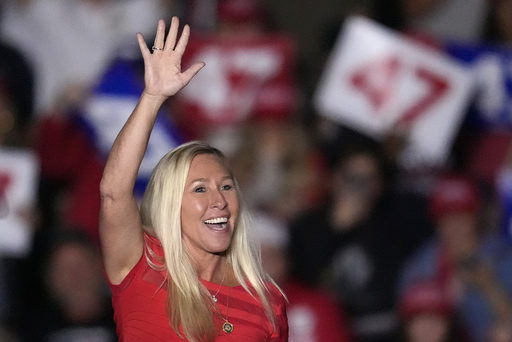WASHINGTON — Initially, when Elon Musk proposed an initiative aimed at reducing the size of the federal government, Donald Trump appeared to dismiss the idea. The concept, eventually dubbed the Department of Government Efficiency, or DOGE, references a popular online meme featuring a surprised dog from Japan, lending a humorous tone to the proposal.
However, with Trump’s election victory, Musk’s vision may now come to fruition, potentially igniting a constitutional debate regarding governmental power dynamics in Washington. The new department is set to be led by Musk, the wealthiest individual worldwide, alongside Vivek Ramaswamy, a former Republican presidential contender and entrepreneur. This group will function as an external advisory panel, collaborating with government officials to streamline spending and ease regulations.
This week, Musk and Ramaswamy revealed their intentions to push Trump toward enacting spending cuts by withholding funds allocated by Congress, a strategy known as impounding. This approach challenges a 1974 regulation designed to prevent presidents from following in the footsteps of Richard Nixon, who famously curtailed funding he disapproved of. Musk and Ramaswamy, in an opinion piece, acknowledged the expected pushback from established interests within Washington but expressed confidence in their approach, declaring, “Now is the moment for decisive action.”
Trump has previously indicated a willingness to leverage this strategy, stating last year his plan to “use the president’s long-recognized impoundment power to squeeze the bloated federal bureaucracy for massive savings.” Such a move would be a bold expansion of executive authority, especially with a supportive Republican Congress and a conservative-leaning U.S. Supreme Court, potentially leading to one of the most scrutinized legal battles during his second term.
Political analysts suggest that this maneuver could pose significant challenges, with some experts asserting that it may undermine the traditional power of Congress over federal funding. “Congress’ power of the purse will turn into an advisory opinion,” noted a governance studies fellow at a Washington think tank. Musk and Ramaswamy are in the midst of articulating their operational strategies for the new department.
Currently, the framework for the Department of Government Efficiency is under development. The organization has issued calls for “super high-IQ small-government revolutionaries willing to work 80+ hours per week on unglamorous cost-cutting.” Interested individuals are asked to submit their applications through X, a social media platform controlled by Musk.
In their editorial, Musk and Ramaswamy offered more comprehensive insights into their proposed methodologies and potential areas for cuts. They mentioned classic targets such as the $535 million dedicated to the Corporation for Public Broadcasting. However, their intentions extend further, aiming to reevaluate the size of the federal workforce. They plan to ascertain the “minimum number of employees required at an agency for it to perform its constitutionally permissible and statutorily mandated functions,” paving the way for extensive reductions across government agencies.
Asserting that civil service protections wouldn’t apply in this context, Musk and Ramaswamy emphasized that their strategy is not politically motivated. Some federal workers could be offered “voluntary severance payments for a smooth departure.” Others may be compelled to resign through decisions such as reinstating mandatory in-office attendance five days a week, thereby retracting pandemic-related remote work flexibility. This requirement may lead to a significant number of voluntary resignations, which they would welcome.
Representatives from employee unions have voiced concerns over such cuts, suggesting that they would adversely affect services relied upon by the public. Some union leaders have questioned the qualifications of Musk and Ramaswamy for these tasks. They indicate their preparedness to resist any efforts to diminish the federal workforce vigorously.
No mention was made in the Wall Street Journal of Musk’s previously stated ambition to trim the budget by $2 trillion, nor any discussion of “Schedule F,” a proposal to recategorize federal employees, making it easier to dismiss them. However, Musk and Ramaswamy proposed a strategy for reducing what they see as excessive regulations. Their department, they note, will collaborate with legal experts embedded within government agencies, incorporating advanced technology to evaluate regulations that contravene recent Supreme Court rulings aimed at curbing federal rulemaking.
Experts in budgetary issues are skeptical, recalling that many politicians have pledged to decrease government size in the past without significant outcomes. There exists an extensive network of advocates for virtually every budget line item who are resistant to cuts, leading to protracted political battles. Some analysts believe that the effectiveness of DOGE ultimately hinges on Trump’s engagement and commitment to the project, which is projected to conclude by July 4, 2026.
Ramaswamy mentioned plans for upcoming “Dogecasts” aimed at keeping the public informed about their operations, highlighting their initiative as a historic effort to eliminate “waste, fraud, and abuse.” The sentiment expressed was that the situation may be worse than the public perceives.
Support for the initiative can be expected from congressional allies as well. House Republicans are likely to place Rep. Marjorie Taylor Greene, known for her loyalty to Trump, at the helm of a subcommittee dedicated to collaborating with DOGE. Greene and Rep. James Comer, who leads the House Oversight Committee, have already convened with Ramaswamy as part of preliminary discussions.
Musk’s initial proposal for the DOGE concept came during a live interaction with Trump on X throughout the campaign wherein he suggested a commission to assess governmental spending effectiveness. Expressing eagerness to assist, Musk has focused attention on this initiative while having significant stakes in government contracts through his companies, including SpaceX and Tesla. After allocating around $200 million to bolster Trump’s candidacy, Musk stands to wield considerable influence in the forthcoming administration, further evidenced by Trump’s recent visit to Texas to observe a SpaceX test launch.
DOGE appears to have reinforcement from figures such as Sen. Rand Paul, a Republican from Kentucky, who has persistently criticized federal expenditures. He recently shared that he forwarded “2,000 pages of waste that can be cut” to Musk and Ramaswamy, demonstrating his commitment to assisting their efforts.
